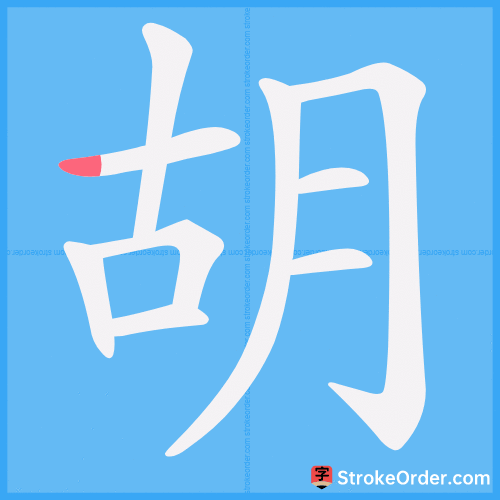胡 Stroke Order
Animated Stroke Order of 胡

Stroke Order Diagrams for 胡

Step-by-Step Handwriting Guide for 胡

Learn to Write Chinese Characters with Video Tutorials
Watch the video of writing the Chinese character "胡", learn the correct stroke order (笔顺) of the character "胡", and master the standard way of writing the character "胡".
Free Printable Handwriting Practice with Stroke Order: 胡
Printable Writing Practice Worksheet of "胡" in Portrait Orientation (Tian Zi Ge)

Printable Writing Practice Worksheet of "胡" in Landscape Orientation (Tian Zi Ge)

Information of 胡
Pinyin
hú
Radical
月
Strokes
9 strokes
Usage
★★★★★
Definition
(surname) / beard / what why how, beard / mustache
胡 [hú]
名
1. 中国古代称北边的或西域的民族。 - In ancient China, it referred to ethnic groups from the north or western regions.
2. 泛指外国或外族的。 - Generally refers to foreigners or non-Han ethnicities.
3. 乱,无道理。 - Chaotic or unreasonable behavior.
4. 文言疑问词,为什么,何故。 - An archaic interrogative word meaning "why" or "for what reason."
5. 嘴周围和连着鬓角长的须毛。 - The hair around the mouth that connects to the sideburns.
6. 古代指兽类颈下垂肉。 - In ancient times, it referred to the hanging flesh below the neck of animals.
7. 巷、小街道称“胡同(tòng)”。 - Refers to alleys or small streets, known as "hutong."
8. 姓。 - A surname.
1. 中国古代称北边的或西域的民族:~人。~服。~姬(西域出生的少女)。~越(“胡”在北方;“越”在南方,喻疏远、隔绝)。 - Refers to ancient ethnic groups from the northern or western regions of China, such as "Hu people," "Hu clothing," "Hu maiden" (a girl from the western regions), and the phrase "Hu and Yue" implying distance or separation.
2. 泛指外国或外族的:~椒。~瓜(黄瓜)。~琴。~笳(古代北方民族的一种管乐器)。 - Generally refers to foreign or non-Han items, such as "Hu pepper," "Hu cucumber," "Hu qin" (a type of instrument), and "Hu jia" (an ancient wind instrument).
3. 乱,无道理:~来。~闹。~吹。~言乱语。 - Chaotic or unreasonable expressions, such as "Hu comes," "Hu disturbance," "Hu boasting," and "Hu talk."
4. 文言疑问词,为什么,何故:~不归?“~取禾三百廛兮?” - An archaic question, meaning "why not return?" or "why take three hundred fields?"
5. 嘴周围和连着鬓角长的须毛:~须。 - Referring to the hair around the mouth and sideburns.
6. 古代指兽类颈下垂肉:“狼跋其~。” - In ancient texts, it referred to the hanging flesh of animals, as mentioned in literature like "The Wolf Walks."
7. 巷、小街道称“胡同(tòng)”(用作巷名时,“同”读轻声不儿化)。 - Small streets or alleys are known as "hutong."
8. 姓。 - It is also a surname.
【本义】牛脖子下的垂肉 - Original meaning: hanging flesh under the neck of cattle.
【造字法】形声。从肉,古声。 - Character formation method: a phonetic-semantic compound.
1. 鸟兽颔下的垂肉或皮囊 (wattle) - The fleshy or pouch-like part that hangs below the beak of birds or animals.
2. 器物上下垂如胡的部分 (st.resembling a wattle) - The part of an object that hangs down like a wattle.
3. 古代称北方和西方的民族如匈奴等为胡 (Hu, non-Han nationalities living in the north and west of China in ancient times) - In ancient times, it referred to non-Han ethnic groups from the north and west, such as the Xiongnu.
胡人大入塞。 - Hu people entered the borders.
代
1. 怎样;何 (how) - Means "how."
2. 为什么;何 (why) - Means "why."
3. 什么;何 (what) - Means "what."
形
1. 黑 (black) - Means "black."
2. 远;大 (far;great) - Means "far" or "great."
副
任意乱来 (outrageously;recklessly) - Refers to acting arbitrarily or recklessly.
鬍 [hú]
名
1. 胡须 (moustache, beard or whiskers) - Refers to facial hair.
2. 衚 [hú] - Related term.
3. 见“胡同” (hútong) “衚” - Referring to the term "hútong."
4. 另见 [hú]. - Refer to "hú."
Netanyahu (name) / Benjamin Netanyahu (1949-), Israeli Likud politician, prime minister 1996-1999 and from 2009
Input Method for 胡
Pinyin
hu2
Wubi
deg
Cangjie
jrb
Zhengma
edjq
Four Corner
47620
Unicode
U+80e1
Same Pronunciation Characters